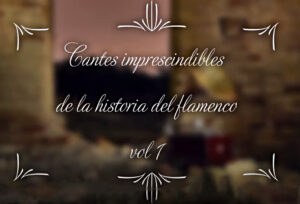XII Edición Flamenco en Red – CANTES IMPRESCINDIBLES DE LA HISTORIA DEL FLAMENCO

Volumen 1
Jose María Castaño en este curso diserta sobre los cantes que han sido clave para la historia y evolución del flamenco. En esta ocasión se centra en la malagueña, los tangos, seguiriyas y martinete y debla, y conduce el contenido a través de la influencia que han tenido sus mayores exponentes.
- Malagueña: “Que te quise con locura” por Don Antonio Chacón (1909)
Accede al vídeo aquí
- Tangos flamencos: “Al Gurugú” por La niña de los peines (1947)
Accede al vídeo aquí
- Seguiriyas: “De Santiago a Santa Ana” por Manuel de la Torre (1929)
Accede al vídeo aquí
- Martinete y Debla: “En el barrio de Triana” por Tomás Pavón (1950)
Accede al vídeo aquí

